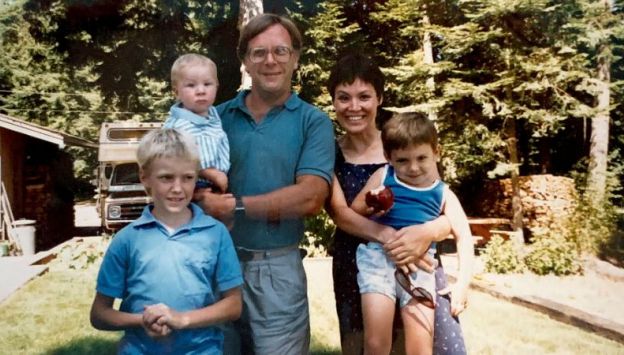A quarter-century ago, a cinematic duo was created.
Reed Harkness was then 18 and had just found his dad’s old super-8 camera. Sam Harkness, his half-brother, was 11 and ready for anything.
“He was this very resilient kid,” Reed told the Television Critics Association. “He was always taking falls and then getting right back up again.”
They made goofy films with Sam as The Blue Panther, forever crashing, smashing and surviving. Then they made a dead-serious one about surviving something in real life: When Sam and his older brother Jared were in their early teens, their mother simply vanished.
In a way, Reed “spent 25 years making ‘Sam Now,’” said producer Lois Vossen. Her “Independent Lens” series will show the documentary (shown here) at 10 p.m. next Monday (May 8) on most PBS stations.
“Sam Now” is partly a mystery, probing what happened to Jois. (She’s shown here earlier with Sam, who’s the youngest, plus Jared, Reed and their dad.) It also ponders how people approach a personal loss. They could:
— Set it aside and go on with life. That’s how Sam said Jois handles the movie: “It’s a subject we don’t talk about at all. I am still in contact with my mom, but we don’t talk about it.”
— Or take Reed’s opposite approach: “I feel everything and I feel so much pain when I experience things …. I was maybe feeling some of the feelings for Sam that he wasn’t in touch with.”
Mostly, Sam has an active, zestful approach to life. He was on the national ultimate-Frisbee team, winning a world championship. He’s always seemed indestructible.
“He fell off a high dive once, onto the concrete,” Reed said. “An ambulance came; he got up and walked away. He fell out of a treehouse; he was always bouncing back.”
So they made movies in which the Blue Panther prevailed. But Reed pondered the bigger question: How could someone survive the fact that his mother had simply disappeared?
It’s not a fair question, Sam says. If a dad had left “it wouldn’t be a story at all …. There’s so much crazy pressure for moms. Her disappearing is a huge deal, because moms aren’t supposed to do that.”
Indeed, when she’s found in the film, Jois comes across as sunny and likable. She has her own story of abandonment – as a mixed-race 18-month-old, put up for adoption by her mother in Japan, then, she says, emotionally abandoned by her adoptive parents in the U.S.
(In the film, her adoptive mother says flatly: “As far as I’m concerned, there is no Jois.”)
For some, the subject is still painful. “Every time I finish (the film), I find another emotion,” said Cindy Harkness Howard. Her own children, she said, are roughly the age of her nephews, Sam and Jared. “What if this happened to my kid? I can’t imagine it.”
But the rest of the family had the opposite approach — just keep going, without talking about it. When Reed and Sam first returned home to celebrate finding Jois, the others were, instead, feting a cousin who’d been in a videogame tournament.
In some ways, the just-ignore-it approach seems to work. The film shows Jois in a long relationship with an accomplished scholar; it shows Sam in a five-year relationship with his girlfriend.
He does make an effort, he told the TCA, “to feel sadness and feel fear and anger and not just be a happy kid all the time. I had to work on that pretty hard. But I’m pretty joyful.”
At 36, he’s the former Blue Panther, a current violence-prevention instructor and a perpetual Frisbee whiz. Rather cheerfully, he’s Sam now.

“Sam Now”: a real-life, missing-mom adventure
A quarter-century ago, a cinematic duo was created.
Reed Harkness was then 18 and had just found his dad’s old super-8 camera. Sam Harkness, his half-brother, was 11 and ready for anything.
“He was this very resilient kid,” Reed told the Television Critics Association. “He was always taking falls and then getting right back up again.”
They made goofy films with Sam as The Blue Panther, forever crashing, smashing and surviving. Then they made a dead-serious one about surviving something in real life: When Sam and his older brother Jared were in their early teens, their mother simply vanished.
In a way, Reed “spent 25 years making ‘Sam Now,’” said producer Lois Vossen. Her “Independent Lens” series will show the documentary (shown here) at 10 p.m. next Monday (May 8) on most PBS stations. Read more…